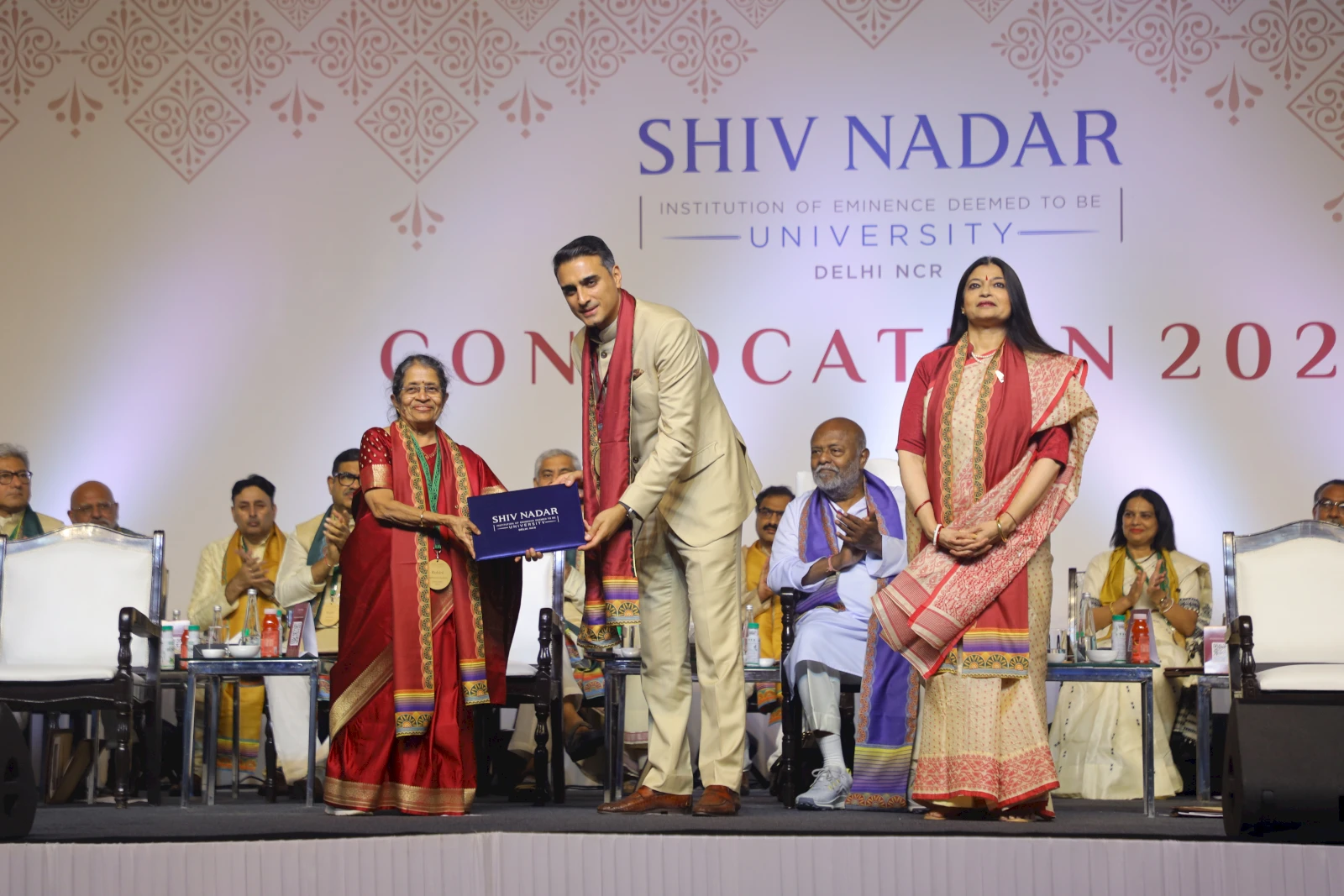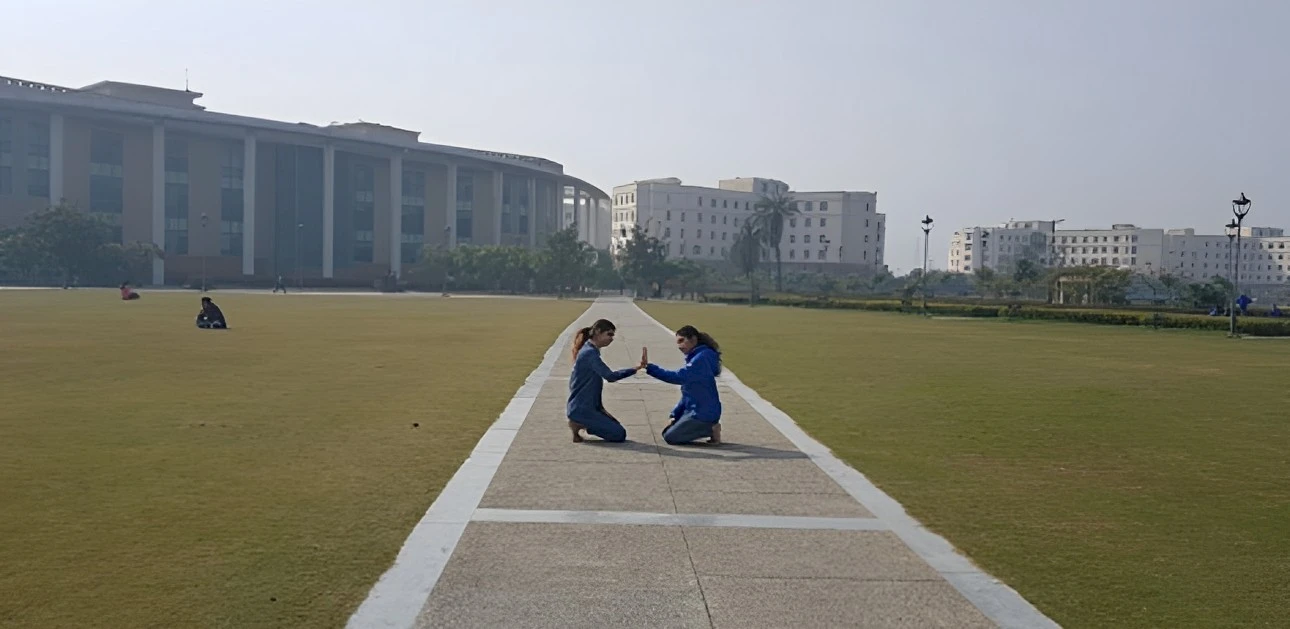In Conversation with Professor Rohini Godbole. . .

Editorial / August 07, 2023
ConvocationgraduationPhysicshonorary doctorateSTEMShiv Nadar Institution of Eminence conferred Professor Rohini Godbole with an honorary doctorate for her outstanding contributions to science, promotion of science, and service of women’s empowerment in science. She exemplifies the university’s values, mission and vision and provides a role model of integrity and inspirational leadership to the Shiv Nadar IoE community.
Padma Shri awardee Professor Rohini Godbole is a leading particle physicist and a crusader for women in STEM. Professor Godbole’s work on high-energy photons had implications for designs of colliders that explore mysteries of the universe. Globally known for her work in the physics explorations at the particle colliders such as the Large Hadron Collider at the European Organization for Nuclear Research (CERN), she has been bestowed with France’s Ordre National du Mérite in 2021 and D.Sc. at IIT (K) from Prime Minister Shri Narendra Modi.
Professor Godbole is among the few women elected to all three Academies of Science in India and The World Academy of Sciences. She was involved in bringing out the “INSA Report: Access for Indian Women to Careers in Science,” the first such study in India. She has conceived and co-edited the book Lilavati’s Daughters – The Women Scientists of India.
Professor Godbole’s spectacular journey is truly inspirational and extends far beyond STEM.
Edited excerpts from a conversation with Professor Godbole:
How are you feeling today/at this moment?
This is a lovely feeling. I am pleased that Shiv Nadar Institution of Eminence has decided to bestow this honour on me. This is the first time I’m getting an honorary doctorate from an institution where I’m already, though as a visiting professor, part of the system. It’s like people at home patting your back and saying, ‘We are so proud of you.’ This is an entirely different feeling than what I experienced at other institutions.
What inspired you to pursue theoretical physics as a field of study?
I’d say I did not know, frankly. I did not even study science till the 7th grade. The seeds of my life in science were sown when I decided to appear for the ’State Scholarship Examination’, which used to be conducted in 7th grade. The examination had a paper in ’General Science’. Since my highly reputed girls’ school taught only ’Home Science’ till the 7th grade, it was not a surprise that no student from my school had gotten this scholarship. My teachers agreed to teach me outside the school hours and on holidays. Not only did they teach me things that I needed to know to succeed in the examination, but they opened my eyes to the world of science in general. They pointed me to a popular science magazine called ’Srishti Dnyan’ in Marathi, nurtured my interest in mathematics and encouraged me to participate in science essay competitions. But from there, how did I land in theoretical physics?
In my earlier days, I was not keen on studying mathematics. I kept physics closer to my heart because I felt that physics would always give me a job. After finishing my B.Sc. in Physics, I realized I was not good at experimental work and was not very good with my hands. Soon after, I went to IIT Bombay and met one teacher who opened my eyes to what ‘theoretical physics’ can be. It dawned on me that it’s a combination of mathematics and physics and that one needs to be adept at high-profile mathematics to understand the mysteries of nature. The potent question of what protons are made up of was just being understood in 1968. It required techniques I was skilled at. I felt that what I write and the equations I solve tell me why the world around us works the way it works. They have the strength, the power to encapsulate humanity’s knowledge about the structure of things. Once I realized that, there was no looking back. Thus, it is this wonder of what the universe is and how natural science is understood that kept me going. These days you apply theoretical physics to biological systems, and then you ask the question, why does a plant behave the way it behaves? I have been sold on theoretical physics for 60 years and am still happy with it.
What will be your one message for the graduating batch?
Choose a problem that excites you and not just what’s in fashion. Carefully think about what you want to do. Assess whether your dream can be a reality. Because I can always dream of going to the moon, but I may not have the wherewithal to do it. Follow your mind and heart. Don’t let others tell you what you should and should not do. Once you choose your way of life through that, no obstacle is too difficult, and no mountain is too high.
Research can go through ups and downs and many frustrating moments. How do you cope with failures, especially when your most favorite hypothesis bites the dust?
The best way to deal with failure is to get up in the morning and say, ‘Today is another day. I have new aims, new goals, and new tools.’ It is better to let go of your failures but not forget them; you need to learn from them. In research, this happens quite often, and the trick lies in understanding the processes of science to realize when you should let go of an idea. That’s something you learn as you go along. Cut your losses but learn from them. If you keep dwelling on that, you will not move forward. But if you forget it, you are liable to make the same mistakes. A famous philosopher George Santayana once said, “Those who do not learn from history are doomed to repeat it.”
Did you have any 'Eureka' moments in your scientific career?
There have been a few ‘aha!’ moments, which are of different types. It is finding at the end of a long week that the predictions of a model you and your collaborators have put together agree with the data. It is being present at CERN on the day of the announcement of the discovery of the Higgs: a subject that has formed a major part of my scientific investigations and giving lectures within the hour, on the subject of the Standard Model, to summer students at CERN. It is meeting a student in the Netherlands and her showing me a video of my lecture which she attended at a school in Oran (Algeria), it is meeting a student in Beijing while travelling for the meeting of the advisory body of the Circular Electron Positron Collider in planning in China, him telling me that he had listened to my lectures at CERN in that summer few years back. It is seeing an increase in the impact factor of a journal one has been editor of or a young student telling how he still remembers a talk on particle physics that he heard from me in the library of a university department in Srinagar. I have been able to savour many such moments. These are the true rewards of a life in science.
How do you envision the role of women in STEM fields evolving and becoming more inclusive in the coming years?
Gender equity in all walks of life is important. But gender equity in science is very important. It is important for all of us to realise that the efforts to achieve gender equity are not to be looked upon as charity or justice for women but also as a process that benefits science itself. Diversity in the scientific workforce can only make the complex space of research, innovation and knowledge more vibrant and hence more productive. Women need to do science to give full expression to their intellectual abilities, but science also needs women. It is science for women and women for science. The sooner we understand this two-way street, the sooner we will reach a day when we stop talking about women scientists and women engineers. They will be just scientists and engineers who happen to be women. I also think inclusivity should be considered through all aspects – gender, race, caste, creed, language, knowledge systems and everything. Science needs to be inclusive. I dream of that day!
More Blogs

The Hawthornden Literary Retreat bestowed on Dr Sambudha Sen to complete the manuscript of a novel
Professor Sambudha Sen, Head of the Department of English at Shiv Nadar Institution of Eminence, Delhi-NCR, was awarded a residency at the...

The Power of the Moving Body
Movement is an innate bodily action that humans have been exhibiting for the longest time. Long before language was invented, the body was the...

How Does A Multi-Disciplinary Approach To Education Enhance Learning And Prepare Students For A Multi-Faceted World?
In today’s world, where businesses are changing almost every day, it is the responsibility of educational institutes to provide holistic...